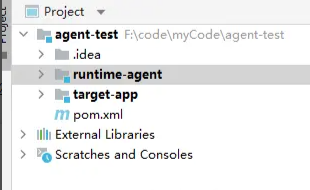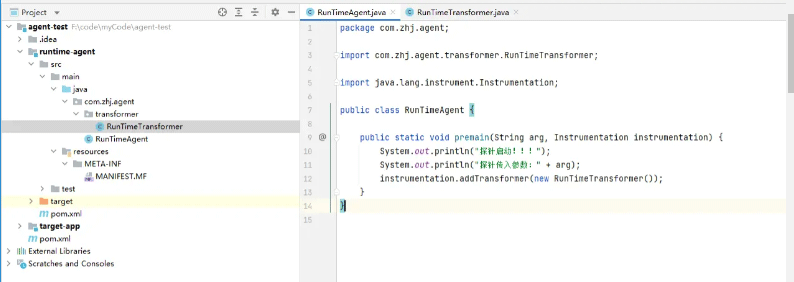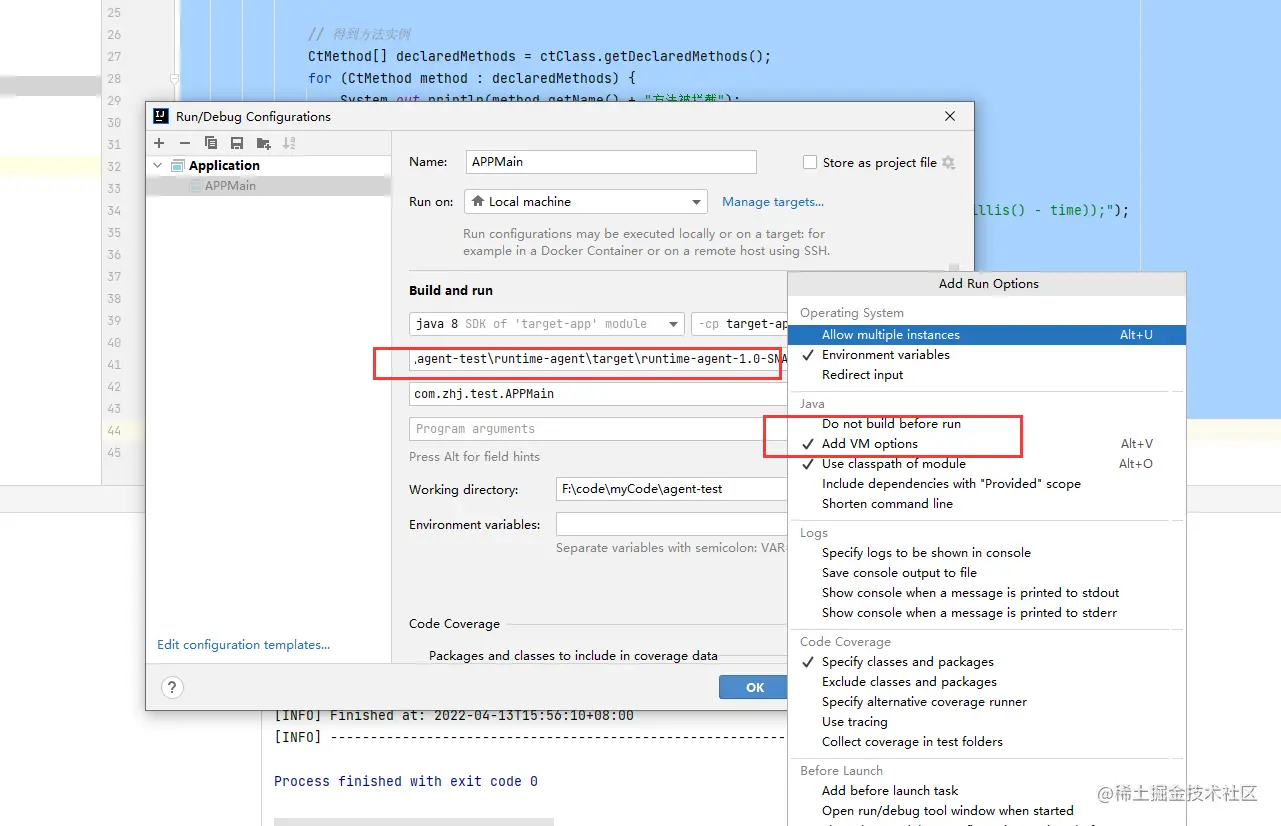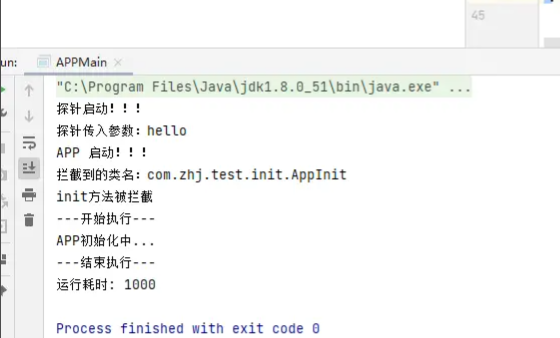How to use Java Agent
Introduction to Java Agent technology
Java Agent is literally translated as Java agent, and is also often called Java probe technology.
Java Agent This technology was introduced in JDK1.5 and can dynamically modify Java bytecode at runtime. Classes in Java are compiled to form bytecodes that are executed by the JVM. The JVM obtains the information of these bytecodes before executing these bytecodes, and modifies these bytecodes through a bytecode converter to complete the process. Some extra features.
Java Agent is a jar package that cannot run independently. It works through the JVM process attached to the target program. When starting, you only need to add the -javaagent parameter to the startup parameters of the target program to add ClassFileTransformer bytecode converter, which is equivalent to adding an interceptor before the main method.
Java Agent function introduction
Java Agent mainly has the following functions:
Java Agentcan Intercept and modify the Java bytecode before loading;Java Agent can modify the loaded bytecode while the Jvm is running;
Application scenarios of Java Agent:
Debugging function of IDE, such as Eclipse, IntelliJ IDEA;
Hot deployment functions, such as JRebel,
# Various performance analysis tools, such as Visual VM, JConsole, etc.; - Full-link performance detection tools, such as Skywalking, Pinpoint, etc.;
- Java Agent implementation principle
-
Before understanding the implementation principle of
Java Agent , you need to have a clear understanding of the Java class loading mechanism. One is to execute through premain before the man method is executed, and the other is to modify the program while it is running, which needs to be implemented through Attach in the JVM. The implementation principle of Attach is based on JVMTI.
Mainly intercepts and modifies the bytecode before class loading
Let’s introduce these key terms respectively:
JVMTI is
JVM Tool Interface- , which is a collection of interfaces exposed by the JVM for user extensions. JVMTI is event-driven and will be triggered every time the JVM executes certain logic. Callback interfaces for some events. Through these callback interfaces, users can extend themselves
JVMTI is the unified basis for implementing tools such as Debugger, Profiler, Monitor, Thread Analyser, etc., in mainstream Java virtual machines All are implemented
is a dynamic library that uses some interfaces exposed by JVMTI to do things we want to do but cannot do under normal circumstances. thing, but in order to distinguish it from ordinary dynamic libraries,
it generally implements one or more functions as follows:##Agent_OnLoad Function, if the agent is loaded at startup, set it through JVM parameters
Agent_OnAttach
Function, if the agent is not loaded at startup, but us First attach to the target process, and then send the load command to the corresponding target process to load. The Agent_OnAttach functionAgent_OnUnload
function will be called during the loading process. When the agent is uninstalled, it is called-
JPLISAgentjavaagentwhich depends on the instrument's JVMTIAgent (the corresponding dynamic library under Linux is libinstrument.so), and there are also individuals named (Java Programming Language Instrumentation Services Agent), which specifically provides support for instrumentation services written in Java language -
instrument
through a method similar to -javaagent:jar package path. Dynamic loading at runtime relies on the JVM's attach mechanism, and the agentimplements Agent_OnLoad and Agent_OnAttach has two methods, which means that when used, the agent can be loaded at startup or dynamically loaded at runtime. Loading at startup can also indirectly loadinstrument agent is loaded by sending the load command. JVM Attach
refers to an inter-process communication function provided by JVM, which allows one process to pass commands to another process and perform some internal operations, such as Thread dump, then you need to execute jstack, and then pass the pid and other parameters to the thread that needs to dump to execute- Java Agent case
We will use the print method Taking the execution time as an example, it is achieved through Java Agent
.
Maven
project, in which we build two Maven sub-projects, one for implementing the plug-in Agent, and one for implementing the test target program.We import the packages that the two projects have common dependencies on in the parent application
<dependencies>
<dependency>
<groupId>org.javassist</groupId>
<artifactId>javassist</artifactId>
<version>3.28.0-GA</version>
</dependency>
</dependencies> First we build the test Target program
First we build the test Target program
// 启动类
public class APPMain {
public static void main(String[] args) {
System.out.println("APP 启动!!!");
AppInit.init();
}
}
// 模拟的应用初始化的类
public class AppInit {
public static void init() {
try {
System.out.println("APP初始化中...");
Thread.sleep(1000);
} catch (InterruptedException e) {
e.printStackTrace();
}
}
}然后我们启动程序,测试是否能正常执行,程序正常执行之后,我们开始构建探针程序
探针程序中我们需要编写,改变原有class的Transformer,通过自定义的Transformer类完成输出方法执行时间的功能,

首先构检Agent程序的入口
public class RunTimeAgent {
public static void premain(String arg, Instrumentation instrumentation) {
System.out.println("探针启动!!!");
System.out.println("探针传入参数:" + arg);
instrumentation.addTransformer(new RunTimeTransformer());
}
}这里每个类加载的时候都会走这个方法,我们可以通过className进行指定类的拦截,然后借助javassist这个工具,进行对Class的处理,这里的思想和反射类似,但是要比反射功能更加强大,可以动态修改字节码。
javassist是一个开源的分析、编辑和创建Java字节码的类库。
import javassist.ClassPool;
import javassist.CtClass;
import javassist.CtMethod;
import java.lang.instrument.ClassFileTransformer;
import java.lang.instrument.IllegalClassFormatException;
import java.security.ProtectionDomain;
public class RunTimeTransformer implements ClassFileTransformer {
private static final String INJECTED_CLASS = "com.zhj.test.init.AppInit";
@Override
public byte[] transform(ClassLoader loader, String className, Class<?> classBeingRedefined, ProtectionDomain protectionDomain, byte[] classfileBuffer) throws IllegalClassFormatException {
String realClassName = className.replace("/", ".");
if (realClassName.equals(INJECTED_CLASS)) {
System.out.println("拦截到的类名:" + realClassName);
CtClass ctClass;
try {
// 使用javassist,获取字节码类
ClassPool classPool = ClassPool.getDefault();
ctClass = classPool.get(realClassName);
// 得到该类所有的方法实例,也可选择方法,进行增强
CtMethod[] declaredMethods = ctClass.getDeclaredMethods();
for (CtMethod method : declaredMethods) {
System.out.println(method.getName() + "方法被拦截");
method.addLocalVariable("time", CtClass.longType);
method.insertBefore("System.out.println(\"---开始执行---\");");
method.insertBefore("time = System.currentTimeMillis();");
method.insertAfter("System.out.println(\"---结束执行---\");");
method.insertAfter("System.out.println(\"运行耗时: \" + (System.currentTimeMillis() - time));");
}
return ctClass.toBytecode();
} catch (Throwable e) { //这里要用Throwable,不要用Exception
System.out.println(e.getMessage());
e.printStackTrace();
}
}
return classfileBuffer;
}
}我们需要在Maven中配置,编译打包的插件,这样我们就可以很轻松的借助Maven生成Agent的jar包
<build>
<plugins>
<plugin>
<groupId>org.apache.maven.plugins</groupId>
<artifactId>maven-compiler-plugin</artifactId>
<version>3.5.1</version>
<!-- 指定maven编译的jdk版本。若不指定,maven3默认用jdk 1.5 maven2默认用jdk1.3 -->
<configuration>
<source>8</source>
<target>8</target>
</configuration>
</plugin>
<plugin>
<groupId>org.apache.maven.plugins</groupId>
<artifactId>maven-jar-plugin</artifactId>
<version>3.2.0</version>
<configuration>
<archive>
<!--自动添加META-INF/MANIFEST.MF -->
<manifest>
<addClasspath>true</addClasspath>
</manifest>
<manifestEntries>
<Menifest-Version>1.0</Menifest-Version>
<Premain-Class>com.zhj.agent.RunTimeAgent</Premain-Class>
<Can-Redefine-Classes>true</Can-Redefine-Classes>
<Can-Retransform-Classes>true</Can-Retransform-Classes>
</manifestEntries>
</archive>
</configuration>
</plugin>
</plugins>
</build>否则我们需要在resources下创建META-INF/MANIFEST.MF文件,文件内容如下,我们可以看出这个与Maven中的配置是一致的,然后通过配置编译器,借助编译器打包成jar包,需指定该文件
Manifest-Version: 1.0 Premain-Class: com.zhj.agent.RunTimeAgent Can-Redefine-Classes: true Can-Retransform-Classes: true
告示文件MANIFEST.MF参数说明:
Manifest-Version
文件版本
Premain-Class
包含 premain 方法的类(类的全路径名)main方法运行前代理
Agent-Class
包含 agentmain 方法的类(类的全路径名)main开始后可以修改类结构
Boot-Class-Path
设置引导类加载器搜索的路径列表。查找类的特定于平台的机制失败后,引导类加载器会搜索这些路径。按列出的顺序搜索路径。列表中的路径由一个或多个空格分开。(可选)
Can-Redefine-Classes true
表示能重定义此代理所需的类,默认值为 false(可选)
Can-Retransform-Classes true
表示能重转换此代理所需的类,默认值为 false (可选)
Can-Set-Native-Method-Prefix true
表示能设置此代理所需的本机方法前缀,默认值为 false(可选)
最后通过Maven生成Agent的jar包,然后修改测试目标程序的启动器,添加JVM参数即可
参数示例:-javaagent:F:\code\myCode\agent-test\runtime-agent\target\runtime-agent-1.0-SNAPSHOT.jar=hello

最终效果:

The above is the detailed content of How to use Java Agent. For more information, please follow other related articles on the PHP Chinese website!

Hot AI Tools

Undresser.AI Undress
AI-powered app for creating realistic nude photos

AI Clothes Remover
Online AI tool for removing clothes from photos.

Undress AI Tool
Undress images for free

Clothoff.io
AI clothes remover

Video Face Swap
Swap faces in any video effortlessly with our completely free AI face swap tool!

Hot Article

Hot Tools

Notepad++7.3.1
Easy-to-use and free code editor

SublimeText3 Chinese version
Chinese version, very easy to use

Zend Studio 13.0.1
Powerful PHP integrated development environment

Dreamweaver CS6
Visual web development tools

SublimeText3 Mac version
God-level code editing software (SublimeText3)

Hot Topics
 1386
1386
 52
52
 Perfect Number in Java
Aug 30, 2024 pm 04:28 PM
Perfect Number in Java
Aug 30, 2024 pm 04:28 PM
Guide to Perfect Number in Java. Here we discuss the Definition, How to check Perfect number in Java?, examples with code implementation.
 Weka in Java
Aug 30, 2024 pm 04:28 PM
Weka in Java
Aug 30, 2024 pm 04:28 PM
Guide to Weka in Java. Here we discuss the Introduction, how to use weka java, the type of platform, and advantages with examples.
 Smith Number in Java
Aug 30, 2024 pm 04:28 PM
Smith Number in Java
Aug 30, 2024 pm 04:28 PM
Guide to Smith Number in Java. Here we discuss the Definition, How to check smith number in Java? example with code implementation.
 Java Spring Interview Questions
Aug 30, 2024 pm 04:29 PM
Java Spring Interview Questions
Aug 30, 2024 pm 04:29 PM
In this article, we have kept the most asked Java Spring Interview Questions with their detailed answers. So that you can crack the interview.
 Break or return from Java 8 stream forEach?
Feb 07, 2025 pm 12:09 PM
Break or return from Java 8 stream forEach?
Feb 07, 2025 pm 12:09 PM
Java 8 introduces the Stream API, providing a powerful and expressive way to process data collections. However, a common question when using Stream is: How to break or return from a forEach operation? Traditional loops allow for early interruption or return, but Stream's forEach method does not directly support this method. This article will explain the reasons and explore alternative methods for implementing premature termination in Stream processing systems. Further reading: Java Stream API improvements Understand Stream forEach The forEach method is a terminal operation that performs one operation on each element in the Stream. Its design intention is
 TimeStamp to Date in Java
Aug 30, 2024 pm 04:28 PM
TimeStamp to Date in Java
Aug 30, 2024 pm 04:28 PM
Guide to TimeStamp to Date in Java. Here we also discuss the introduction and how to convert timestamp to date in java along with examples.
 Java Program to Find the Volume of Capsule
Feb 07, 2025 am 11:37 AM
Java Program to Find the Volume of Capsule
Feb 07, 2025 am 11:37 AM
Capsules are three-dimensional geometric figures, composed of a cylinder and a hemisphere at both ends. The volume of the capsule can be calculated by adding the volume of the cylinder and the volume of the hemisphere at both ends. This tutorial will discuss how to calculate the volume of a given capsule in Java using different methods. Capsule volume formula The formula for capsule volume is as follows: Capsule volume = Cylindrical volume Volume Two hemisphere volume in, r: The radius of the hemisphere. h: The height of the cylinder (excluding the hemisphere). Example 1 enter Radius = 5 units Height = 10 units Output Volume = 1570.8 cubic units explain Calculate volume using formula: Volume = π × r2 × h (4
 Create the Future: Java Programming for Absolute Beginners
Oct 13, 2024 pm 01:32 PM
Create the Future: Java Programming for Absolute Beginners
Oct 13, 2024 pm 01:32 PM
Java is a popular programming language that can be learned by both beginners and experienced developers. This tutorial starts with basic concepts and progresses through advanced topics. After installing the Java Development Kit, you can practice programming by creating a simple "Hello, World!" program. After you understand the code, use the command prompt to compile and run the program, and "Hello, World!" will be output on the console. Learning Java starts your programming journey, and as your mastery deepens, you can create more complex applications.




